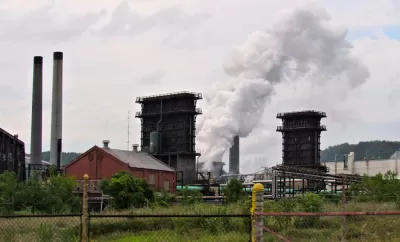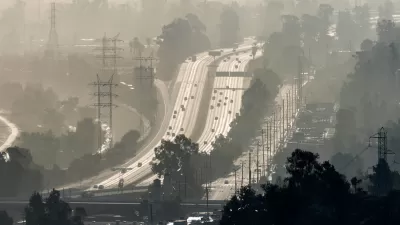Pittsburgh, Pennsylvania took the dramatic step of officially declaring racism a public health threat. Public policy has yet to mitigate the city's worsening air quality, however.

The Pittsburgh City Council voted in December 2019 to declare racism a public health crisis, led by councilmembers Ricky Burgess and R. Daniel Lavelle.
As noted in an article by Brentin Mock, the city's track record of environmental justice has faced criticism from two recent reports: "One was a Columbia Journalism Review report, published in October by Thomas Jefferson University media professor Letrell Deshan Crittenden, entitled [sic] 'The Pittsburgh problem: race, media and everyday life in the Steel City.' The other was a study released in September on gender and race inequality, which found Pittsburgh was statistically among the worst cities for African Americans to live in, particularly for black women."
Mock provides more background on the issues of pollution and race in the city, which calls into question Pittsburgh's accolades at the country's "most livable city." The vote coincidentally timed with weather that blanketed the city in smog for weeks.
According to Mock, the vote by the council followed the lead of Madison and Milwaukee, Wisconsin, the first cities to pass this kind of legislation earlier in 2019. The Pittsburgh City Council's vote, however, lacks any funding to back up words with deeds, so progress on the environmental justice challenges facing the city is still to be determined.
FULL STORY: How Racism Became a Public Health Crisis in Pittsburgh

Maui's Vacation Rental Debate Turns Ugly
Verbal attacks, misinformation campaigns and fistfights plague a high-stakes debate to convert thousands of vacation rentals into long-term housing.

Planetizen Federal Action Tracker
A weekly monitor of how Trump’s orders and actions are impacting planners and planning in America.

Chicago’s Ghost Rails
Just beneath the surface of the modern city lie the remnants of its expansive early 20th-century streetcar system.

Bend, Oregon Zoning Reforms Prioritize Small-Scale Housing
The city altered its zoning code to allow multi-family housing and eliminated parking mandates citywide.

Amtrak Cutting Jobs, Funding to High-Speed Rail
The agency plans to cut 10 percent of its workforce and has confirmed it will not fund new high-speed rail projects.

LA Denies Basic Services to Unhoused Residents
The city has repeatedly failed to respond to requests for trash pickup at encampment sites, and eliminated a program that provided mobile showers and toilets.
Urban Design for Planners 1: Software Tools
This six-course series explores essential urban design concepts using open source software and equips planners with the tools they need to participate fully in the urban design process.
Planning for Universal Design
Learn the tools for implementing Universal Design in planning regulations.
planning NEXT
Appalachian Highlands Housing Partners
Mpact (founded as Rail~Volution)
City of Camden Redevelopment Agency
City of Astoria
City of Portland
City of Laramie





























